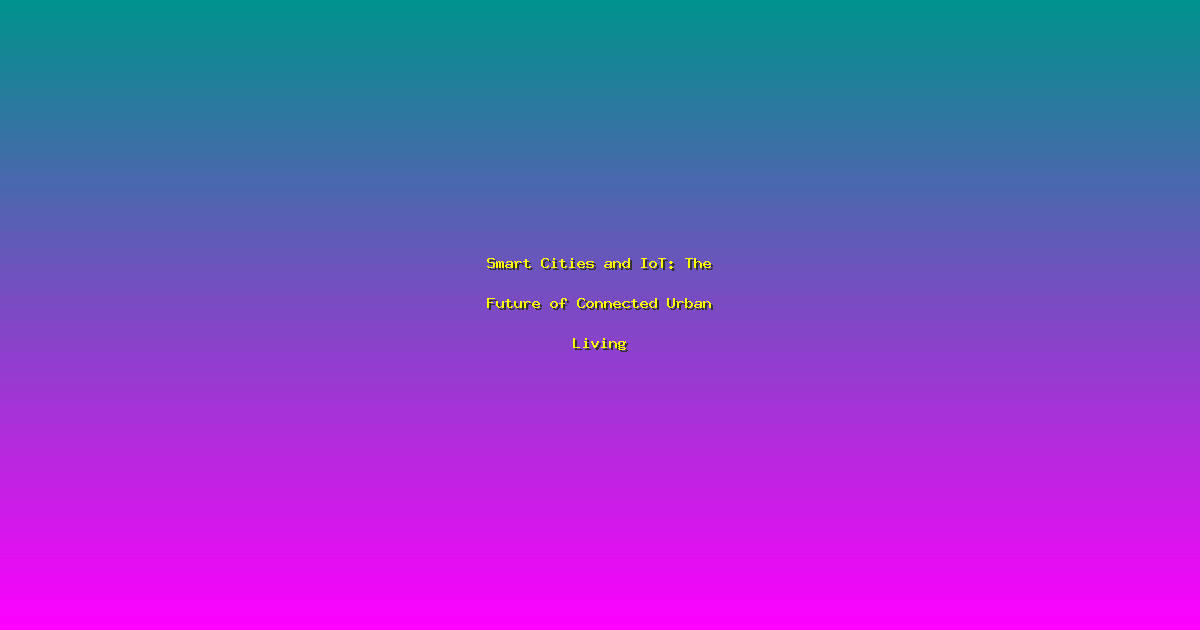Smart Cities and IoT: The Future of Connected Urban Living
In the rapidly evolving landscape of urban development, the integration of Internet of Things (IoT) technology into city infrastructure is revolutionizing the concept of urban living. Smart cities, enabled by IoT, represent the future of urban environments where everyday objects are connected to the internet, allowing for the collection and analysis of data to improve city services and the quality of life for residents. This article delves into the transformative power of IoT in creating smarter, more sustainable cities and explores the benefits and challenges associated with this technological advancement.
The Role of IoT in Smart Cities
The core of a smart city lies in its ability to leverage IoT to collect and analyze data from various sources, including traffic flow, energy consumption, waste management, and public safety. By embedding sensors in these systems, cities can monitor and manage operations in real-time, leading to more efficient use of resources and improved services for citizens. For instance, smart traffic management systems can reduce congestion and pollution, while smart grids can optimize energy distribution, reducing waste and enhancing reliability.
Benefits of Smart Cities Enabled by IoT
The integration of IoT in cities brings numerous benefits, including enhanced sustainability, improved public services, and better quality of life for residents. Sustainable practices are promoted through the efficient use of resources, such as water and energy, while public services like healthcare and education become more accessible and efficient. Additionally, IoT in cities can improve public safety through real-time monitoring and rapid response systems, fostering a safer living environment.
Challenges and Considerations
While the potential benefits of IoT in smart cities are vast, there are also significant challenges to address. Privacy and data security are critical concerns, as the collection and storage of vast amounts of data necessitate robust security measures to protect personal information. Additionally, the implementation of IoT requires substantial investment and infrastructure development, which can be a barrier for some cities. Ensuring that all residents can access and benefit from smart city initiatives is also essential to prevent the digital divide from widening.
FAQs
-
What is the Internet of Things (IoT)?
IoT refers to the network of physical objects embedded with sensors, software, and connectivity that enables data collection and exchange between devices and systems.
-
How do smart city initiatives benefit the environment?
Smart cities use IoT to optimize resource use, reduce waste, and lower emissions, contributing to environmental sustainability.
-
What are some examples of smart city applications?
Applications range from traffic management and smart lighting to waste management and public safety systems.
-
What are the privacy concerns associated with smart cities?
Privacy concerns revolve around the collection, storage, and use of personal data, requiring robust data protection measures.
-
How can cities ensure equitable access to smart city benefits?
Cities must invest in digital infrastructure and services that are accessible to all residents, including those in underserved communities.
-
What is the role of government in fostering smart city development?
Government plays a crucial role in setting policies, standards, and incentives that support the deployment of IoT and the development of smart city projects.
Conclusion and Call to Action
As we move towards a more connected and data-driven future, smart cities and IoT technology stand at the forefront of urban innovation. By embracing IoT, cities can enhance the quality of life for their residents, promote environmental sustainability, and ensure efficient use of resources. However, it is imperative that these advancements are implemented responsibly, with a focus on privacy, security, and equitable access. Interested in learning more about how your city can become smarter? Join us in exploring the future of urban living, where technology meets the needs of tomorrow's cities.

